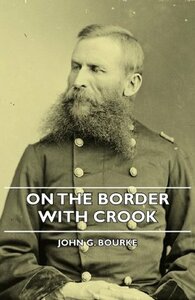Take a photo of a barcode or cover
This is a long book about General Crook who was in charge of the U. S. Army in the Arizona Territory during the pacification of the Apache Indians. It comes across as something of a hagiography because it was written by an Army officer that served under him and admired him greatly. Indeed, if you read this book, Crook never made a mistake and it was due to his influence alone that the Apache were pacified.
The book is a little boring overall, although it has specific moments that are pretty interesting. Mr. Bourke has a really good description of the Apache Indians and some of their culture, including a fascinating passage explaining how the Apache made food out of cactus and other desert plants. They were amazingly adapted to the environment in which they lived, and in some ways unbelievably adapted. Bourke says that the Apache could travel up to 75 miles in a day when they were under pursuit or needed to move quickly. Remember that this was in the hot, arid desert. Indeed, it's scarcely believable to the current day that they had this kind of endurance.
The book is a reflection of its time, so Bourke generally refers to the Apache as "savages," a name that I'm sure an Apache at the time (and certainly to the modern day) would probably have argued was inflammatory and inaccurate going by their culture. Interestingly, Bourke says that when he came to Arizona as an Army officer, he was of "the only good Indian is a dead Indian" opinion. This changed when he came into close contact with the Apache and began to understand them. He ends up being an advocate for them (after they are pacified) and the unconscionable treatment of the Apache from the U. S. government in general and the Interior Department in particular.
Conversely, if you put yourself into the shoes of an Arizona settler with atrocities from the Apache being committed seemingly every week (and it was brutal, I won't bother describing some of the depredations committed by the Apache, but they could be heartless and brutal), you could understand why the Apache weren't very loved in the Arizona Territory.
The book is a little boring overall, although it has specific moments that are pretty interesting. Mr. Bourke has a really good description of the Apache Indians and some of their culture, including a fascinating passage explaining how the Apache made food out of cactus and other desert plants. They were amazingly adapted to the environment in which they lived, and in some ways unbelievably adapted. Bourke says that the Apache could travel up to 75 miles in a day when they were under pursuit or needed to move quickly. Remember that this was in the hot, arid desert. Indeed, it's scarcely believable to the current day that they had this kind of endurance.
The book is a reflection of its time, so Bourke generally refers to the Apache as "savages," a name that I'm sure an Apache at the time (and certainly to the modern day) would probably have argued was inflammatory and inaccurate going by their culture. Interestingly, Bourke says that when he came to Arizona as an Army officer, he was of "the only good Indian is a dead Indian" opinion. This changed when he came into close contact with the Apache and began to understand them. He ends up being an advocate for them (after they are pacified) and the unconscionable treatment of the Apache from the U. S. government in general and the Interior Department in particular.
Conversely, if you put yourself into the shoes of an Arizona settler with atrocities from the Apache being committed seemingly every week (and it was brutal, I won't bother describing some of the depredations committed by the Apache, but they could be heartless and brutal), you could understand why the Apache weren't very loved in the Arizona Territory.
